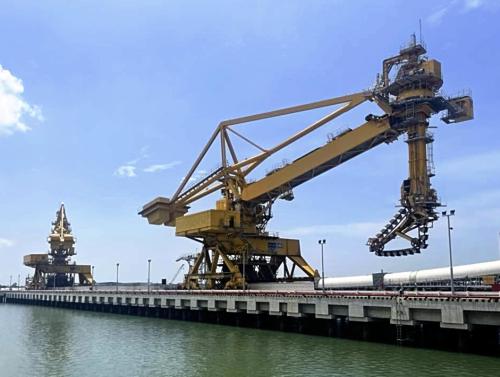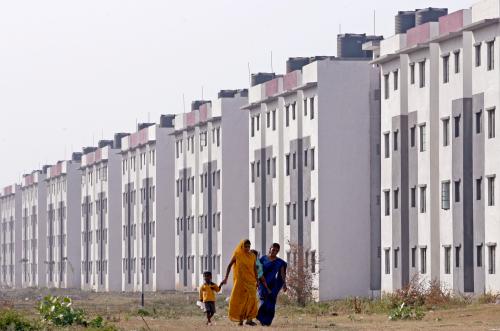While combat continues in Eastern Ukraine, a perhaps more important battle for the soul of Ukraine is playing out in the political corridors and the corporate boardrooms of Kyiv. Since independence, Ukraine has struggled continuously to break the iron triangle of oligarchic rule, corruption, and financial instability that has left Ukraine mired in poverty. It has made depressingly little progress. That struggle has entered a new phase and acquired a new momentum after the Maidan revolution, the Russian invasion of Crimea and Eastern Ukraine, and the formation of a new reform-minded government. But the old demons remain and the early signs are that victory in the new struggle may prove as elusive as in the old.
The new Ukrainian government is well aware of the challenges. Ukraine’s Finance Minister Natalie Jaresko came to Washington, D.C. last week to ask for support in helping her country in finding a solid financial footing. In a speech at Brookings, she laid out the young government’s challenges. Although it is at war, she said, “the war of creating a reformed market economy that is strong and capable and can lead Ukraine forward” is perhaps of larger importance.
The list of tasks Jaresko laid out was daunting. President Petro Poroshenko and his government must “stabilize the economy, reform the country, fight corruption, improve transparency and accountability, improve the rule of law, [and] create conditions for the return of economic growth and prosperity.” Ukraine’s government seems to recognize the urgency in making quick reforms that will have an impact on Ukrainians’ daily lives. Minister Jaresko spoke of the forthcoming roll-out of a new policing system, an increase in taxes for the very wealthy, eventual reduction in payroll taxes, and a simplified tax system.
But the difficulty of these tasks was brought into sharp relief this weekend, when the powerful oligarch Igor Kolomoiskiy took umbrage at the firing of one of his acolytes, Oleksander Lazorko, as head of the state-owned oil-pipeline operator UkrTransNafta. After Lazorko barricaded himself in the office and refused to leave, Kolomoiskiy appeared in central Kyiv with a small battalion of masked, armed men in tow.
This incident epitomizes what Jaresko called “the old ways of doing business in Ukraine.” Since Ukraine gained independence from the Soviet Union in 1991, Ukraine’s economy has been held hostage to the desires of an elite, ruthless few. State-owned businesses are still key strategic assets in an internal struggle between oligarchs. And those oligarchs will not hesitate to resort to extralegal means to maintain their sources of income and their power.
Kolomoiskiy is a perfect example of the type. Although a one-time partisan of former Prime Minister Yulia Tymoshenko, he was appointed the governor of Ukraine’s east-central and heavily industrial Dnipropetrovsk region by the new government because it urgently needed his help. In the process, he has recast his image as a Ukrainian patriot. Many credit his strong hand at the helm of the region, as well as his personal financing of volunteer battalions, materiel for regular troops, and bounties placed on the heads of Russian fighters, as key to having stopped the separatists’ push into other parts of Ukraine.
But those volunteer battalions receive their salaries from Kolomoiskiy, not the government of Ukraine. He has in effect raised a large private army that he has now proven ready to employ to protect his interests should they diverge from those of the government.
On his blog last week, Ukrainian Parliament member and former journalist Mustafa Nayyem argued for Kolomoiskiy’s dismissal: “As a class, oligarchs represent as great a danger to the community as does the external enemy on our eastern border. They are the sources of corruption… And most important, it is they who are least interested in the building of a new country.”
It is the mission of building a new country that concerned Minister Jaresko most. “The Ukrainian people have chosen their set of values,” she argued. “…it’s about having a market economy that’s competitive and not driven by either oligarchs or other interests. And I think Ukraine has made that choice. I think they’ve made that choice and there’s no going back.”
But Ukraine has made that choice before and gone back. The long-suffering citizens of Ukraine have seen a similar movement—2004’s Orange Revolution—fail before. And now again, episodes like that at UkrTransNafta do not encourage them to believe that the change they stood for at Maidan last winter will come to fruition.
Reining in men like Kolomoiskiy and the corruption and instability they breed is the central challenge for Ukraine. Such men are first and foremost loyal to themselves. Even steps taken to defend Ukraine are in their interest; no Ukrainian oligarch has any desire to play second fiddle to a conquering Russian one. But nor are they interested in allowing a reformist Ukrainian government to destroy their sources of income or power. As already proven, they will battle to protect their interests, even if that may mean striking a temporary alliance of convenience with centers of power in Russia.
Frustratingly, the West is mostly a bystander in this all-important struggle. Western governments and financial institutions can provide technical expertise and even financial assistance. But this is not at core a technical or financial problem. It is a Ukrainian political struggle and will have to be won or lost by Ukrainians.
Update: Over night, Ukrainian President Petro Poroshenko dismissed Kolomoiskiy as governor of Dnipropetrovsk.
The Brookings Institution is committed to quality, independence, and impact.
We are supported by a diverse array of funders. In line with our values and policies, each Brookings publication represents the sole views of its author(s).




Commentary
Of oligarchs and corruption: Ukraine faces its own demons
March 24, 2015